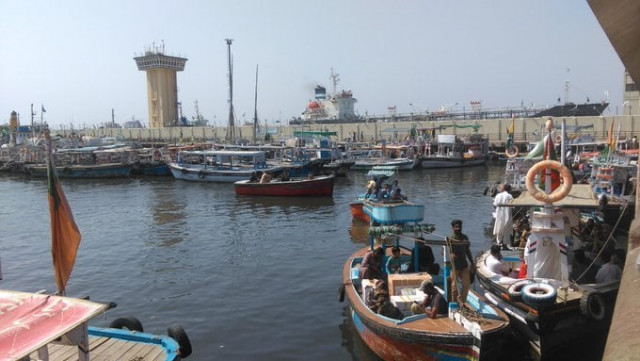Old news: best forgotten
Our institutions are a reflection of who we are. We, as people, are quite happy to move on.

Keemari port. PHOTO: TWITTER (@UrbanPlannerNED)
The Karachi incident is not an isolated incident of negligence. Not long ago, there was a train tragedy in Rahim Yar Khan — one of the worst in the country. A politician, while in the opposition, had said that in any country when there is a train accident, the railway minister resigns for an impartial inquiry to occur. The same politician, when in power, did nothing of the sort when tragedy struck in his reign. The inquiry is mired in controversy about the causes and responsibility. Nothing has changed and the lives lost are lost in vain. Every few weeks, there is some news of pervasive quackery in a clinic or criminal adulteration in food affecting the vulnerable, which fades away after a news flash. Nothing seems to change and we all move on until the next news.
Of course we ought to investigate what happened in Keamari, and the citizens deserve answers and those affected deserve justice. But there is another issue here. What is our collective responsibility to stick with the issues and demand a thorough, independent investigation of serious breaches in consumer protection? Is it the media’s responsibility? Some may argue that in a fast-paced world of media and news, we ought to report what is happening today, not what happened last week. Investigating a matter requires resources, and if the resources are used for following up on each incident, it would mean cutting down on reporting the current issues. Others may say that it is the responsibility of civic groups to insist on transparent, thorough investigation. But such institutions and community support groups are few, ill-funded and disorganised. They barely function.
Our institutions are a reflection of who we are. We, as people, are quite happy to move on. The care and concern for those who fall through the cracks is not going to come from any institution, public or private, until we as a people decide to care about those who live on the margins. In the chaos of life of the newsmakers and the elite, the value of the life of the ordinary citizen has plummeted, and we all seem to be okay with that. The problem is neither with the government, nor with the media; but with us who are quite happy to forget last weeks’ inconvenient news.
Published in The Express Tribune, February 25th, 2020.
Like Opinion & Editorial on Facebook, follow @ETOpEd on Twitter to receive all updates on all our daily pieces.















COMMENTS
Comments are moderated and generally will be posted if they are on-topic and not abusive.
For more information, please see our Comments FAQ